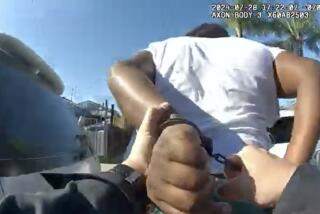Violent confrontation over New York parking replayed in court
- Share via
Reporting from New York — Some people will do anything for a parking space, even beat a woman into a coma, prosecutors contend in an unusual case that shows how the infuriating quest for that rare city luxury forever changed several people’s lives one night last winter.
If anyone ever doubted the weightiness of New York City’s parking woes, they need only consider the public outrage last week after several police officers were arrested and accused of fixing parking tickets for friends, relatives and associates. Or they could have visited a public hearing held Wednesday to discuss legislation that would create residential parking permits for people in some neighborhoods to alleviate parking problems.
But nowhere was the city’s parking strife illustrated so starkly as in a Manhattan courtroom where people this week described a young woman being punched in the face so hard that her feet flew out from beneath her and her skull smacked the pavement “like a watermelon splitting open,” in the words of one witness, Katherine Reilly.
“I’ve never seen anyone so angry over something so mundane as a parking spot,” another witness, Alex Rivas, testified Wednesday as prosecutors rested their case in the assault trial of Oscar Fuller, 35.
Fuller, an electrician and father of two, faces seven years in prison if convicted of assaulting Lana Rosas on Feb. 25. Fuller, who is free on $100,000 bail, has admitted hitting Rosas but said he did so only after she pummeled him in the face. Following his arrest a few days after the incident, Fuller said he did not realize how badly injured Rosas was.
Rosas, 25, was comatose for days and remains brain-damaged, with slurred speech and a helmet protecting her head, said Antonio Esposito, a police detective who testified Tuesday and Wednesday.
Fuller’s and Rosas’ paths crossed on what should have been a Friday night filled with revelry and romance, when the bars and nightclubs of Manhattan’s East Village were just coming alive about 11:30 p.m. Fuller was on his way to his birthday party at a karaoke bar. Rosas had just had dinner with her boyfriend and another couple in Midtown Manhattan, and the two couples were headed to a club in the East Village in separate vehicles.
Rosas’ boyfriend at the time, Joseph Oliver, found a parking spot on 14th Street, a major east-west thoroughfare, and pulled in. Rosas jumped out of the passenger seat and ran across the street to stand in an empty spot and save it for the second couple.
That’s when Fuller, also looking for parking, arrived.
As Rosas’ mother and other relatives listened from the court’s spectator section and wiped away tears, Oliver described watching his 4-foot-11 girlfriend confront Fuller, who was trying to back into the parking spot. Oliver said he saw Rosas stumble after being hit once, and he ran across the street.
“What … are you doing? You just punched my girlfriend in the face!” Oliver recalled yelling at Fuller.
Elizabeth McWilliams, a flamenco dancer who lives in the neighborhood, was walking down 14th Street and heard yelling. So did Reilly, a music teacher headed to a nightclub, and Rivas, out for the evening with his girlfriend. All of them described coming upon the scene as the fight escalated, seconds before the second and final punch was thrown.
Reilly said Fuller drew back his right arm, balled his hand into a fist and unleashed “the hardest, fastest punch I’ve ever seen.”
“It made a huge sound,” McWilliams said of the moment when Rosas’ head hit the ground. “The entire block gasped.”
“This was something a panel of boxing judges would have given him high marks on,” said Rivas, drawing an objection from defense attorney Thomas A. Kenniff, which was overruled by the judge.
Prosecutors have ridiculed Fuller’s statements that he was defending himself when he punched Rosas, calling additional witnesses who saw blood pouring from her mouth and replaying their frantic 911 calls. A neurosurgeon who treated Rosas in the emergency room said chunks of her skull were removed to accommodate her swollen brain.
Esposito, the police detective, said Rosas remembered nothing about the incident. Witnesses, however, gave police the license number of Fuller’s car after he left the scene, and they picked him from a lineup after his arrest.
New York City police issue more than 1 million parking citations a year, with fines ranging from $35 to more than $135, underscoring the extent of revenue the citations bring in and the challenge of finding legal parking here.
The problem lies in part in the city’s history of parking rules. Residential buildings weren’t allowed to have parking garages until 1938. A dozen years later, as car ownership and the city’s population began exploding, updated rules required new residential buildings to offer some off-street parking. Over the decades, however, regulations have been amended and sometimes relaxed to account for varying population densities citywide, and to accommodate developers who balk at the expense of including garage space in new housing.
Large sections of Manhattan have no off-street parking requirements. That, combined with the street-sweeping schedules that require some people to move their cars each morning, adds to city dwellers’ parking woes. It’s not unusual to see people doing what Rosas was doing — standing in a vacant spot to save it — even though traffic regulations prohibit such “unofficial reserving.”
At Wednesday’s hearing on the residential parking permit idea, the City Council’s transportation committee endorsed a bill proposed by a state senator from Brooklyn, one of the most parking-deprived areas of the city, to introduce the permit system to several neighborhoods.
Not everyone supports easing parking woes in the city. Groups that advocate more biking, walking and public transportation say additional parking could undermine efforts to wean people from cars. And the city’s Department of Transportation says a residential parking permit system will be costly to set up and difficult to enforce.
Whatever comes of the idea, it won’t help Rosas, who doctors say may never fully recover.
“You have no idea how horrible this is,” Rosas’ mother, Angie Harrison, said in March as her daughter lay in the hospital. “And the senselessness that it was over a parking spot.”
More to Read
Sign up for Essential California
The most important California stories and recommendations in your inbox every morning.
You may occasionally receive promotional content from the Los Angeles Times.











